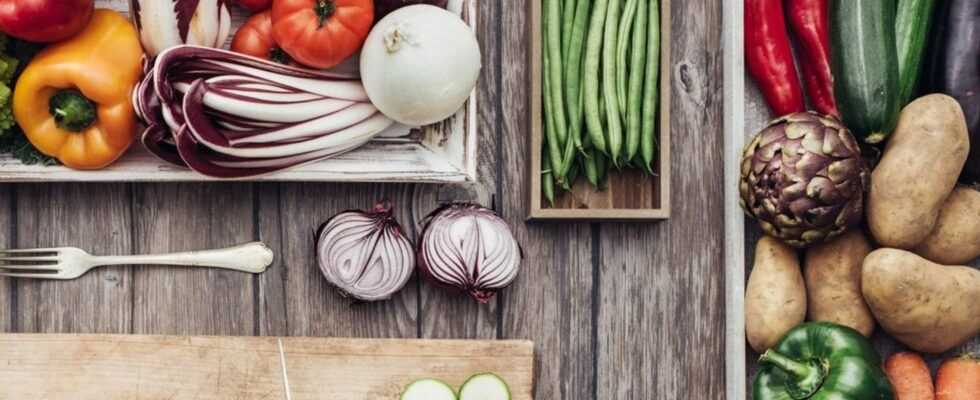Does the food taste bitter or does it cause stomach pain? Toxins could be to blame for this. Care should be taken with these products.
Whether a food is possibly harmful to our body does not depend solely on the best before date. Some products are toxic in certain amounts. In his book “Be careful, there’s poison in there!” (Riva) explains the toxicologist Dr. Carsten Schleh on the dangers of everyday foods. In an interview with the news agency spot on news, the expert reveals which products should be used with caution. He also explains how poisoning can be recognized.
Raw milk
Raw milk is the untreated milk from farm animals. The difference to conventional milk from the supermarket: It is not pasteurized, so it has not been heated to 60 to 100 degrees. “This pasteurization is used with conventional milk from the supermarket to kill microorganisms. Raw milk can therefore be contaminated with microorganisms such as various bacteria,” explains Schleh. The problem: it is impossible to tell whether the raw milk is contaminated with pathogenic microorganisms. The toxicologist warns: “This is why infants, toddlers, the elderly and people with pre-existing conditions associated with an immune deficiency should avoid raw milk. Pregnant people should also play it safe, and generally not drink raw milk.” This would also include dairy products made from raw milk, such as raw milk cheese. Instead, the expert recommends pasteurized milk.
zucchini
“Zucchinis can contain toxic substances called cucurbitacins,” explains Schleh. Normally, the poisonous substances were bred out of the zucchinis. They only occur – if at all – in zucchinis that have been grown themselves. “The focus here is particularly on zucchinis made from home-grown seeds,” says the expert. However, no one has to do without zucchinis.
Consumers quickly recognize whether the summer squash is poisonous: “The presence of cucurbitacins makes for an extremely bitter taste. This taste should therefore be the trigger for better discarding the meal.”
potatoes
Potatoes can contain the poisonous solanine – all parts of the potato plant including the tuber. “Green tubers and sprouted tubers have the highest concentrations,” says Schleh. These would be in and under the shell. “That is why you should avoid green tubers and remove sprouted areas generously. Peeling potatoes is also recommended.” If the potatoes are still green or have sprouted too much, it is better to keep your hands off them right away.
tea
Whether herbal tea, green tea, black tea or fruit tea: The drink could be contaminated with carcinogenic and liver-toxic pyrrolizidine alkaloids, warns the expert. “The poisonous substances were found again and again in investigations, with fruit tea having the lowest levels and herbal tea the highest.” However, these toxic substances cannot be identified as easily as in potatoes and zucchinis, for example. “Unfortunately, consumers cannot tell which type of tea is particularly contaminated and which type of tea is not. Since the pyrrolizidine alkaloids are natural substances, organic teas are affected in the same way as conventional teas.” What helps is “a regular change of the type of tea or the tea supplier in order to spread the risk”. In this way, consumers can prevent long-term high-stress tea from drinking.
“It is also important not to drink tea regularly at temperatures above 60 ° C. This leads to the slightest scalding of the esophagus and increases the risk of esophageal cancer in the long term,” warns the expert.
coffee
According to Schleh, the same applies to the drinking temperature for coffee as for teas. The critical ingredient in the hot beverage is therefore caffeine. The toxicologist explains: “In small amounts it has a stimulating effect. In large amounts it can lead to acute caffeine poisoning. In the long term, caffeine can lead to cardiovascular problems or high blood pressure.” Therefore: coffee yes – but only in moderation. Pregnant women in particular should refrain from regular consumption: “Caffeine can also be critical for unborn life in the womb above a certain dose.”
Schleh cites the assessment of the European Food Safety Authority as a guideline. This indicates that a single dose of caffeine of 3 milligrams per kilogram of body weight is harmless to health.
cinammon
“With cinnamon, the wheat is separated from the chaff,” says Schleh. “Cinnamon can be contaminated with poisonous coumarin. Excessive intake can lead to liver damage.” However, it is known that cassia cinnamon is much more contaminated with coumarin than Ceylon cinnamon. Schleh’s tip: “Consumers should always make sure that Ceylon cinnamon is used, then they are on the safe side.”
This is how you can recognize poisoning
Poisoning with the mentioned foods occurs only in rare cases, Schleh gives the all-clear. If there is something poisonous in the food, it is especially noticeable in the stomach. “Contaminated raw milk can quickly lead to gastrointestinal problems. However, depending on the germ and the amount consumed, serious health problems can arise. If you eat contaminated zucchinis, you may initially experience stomach pain, nausea, vomiting, diarrhea and stomach cramps,” says the expert . Contaminated potatoes would lead to digestive disorders, nausea, vomiting and unconsciousness.
The situation is different with tea: poisoning is noticeable through pain in the abdomen, loss of appetite or fatigue. “Symptoms of acute caffeine intoxication are restlessness, sweating, insomnia, rapid heartbeat. Extreme caffeine intoxication or health conditions can lead to cardiovascular disorders and circulatory failure, Schleh explains.” As a rule, the more toxins you ingest, the stronger the symptoms. On the other hand, the body can tolerate a small amount of toxin. “
